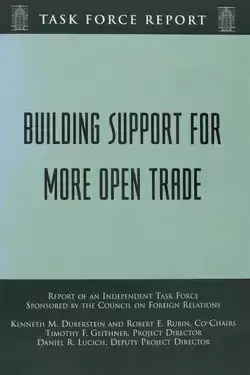
Building Support for More Open Trade
Recommendations

- Task Force Report
- Analysis and policy prescriptions of major foreign policy issues facing the United States, developed through private deliberations among a diverse and distinguished group of experts.
With the current slowdown in the world economy, the expansion of free trade is critically important to economic growth in the United States and abroad—and the United States must move forward on expanding trade now. That is the conclusion of this independent Task Force, which specifically recommends that Congress give Trade Promotion Authority, formerly known as “fast-track,” to the president.
Created to help break America’s political deadlock on trade, and accepting that trade expansion contributes “to economic growth by promoting investment, encouraging competition and technological innovation, and reducing inflation,” the Task Force reached two broad conclusions: trade expansion, when combined with complementary domestic policies, can help address the problems cited by labor, environmentalists, and others concerned with social issues; and the United States must move ahead on Trade Promotion Authority.
More on:
The report outlines recommendations for building a stronger American political consensus on trade expansion. Among its other recommendations: the president should ask Congress for separate votes on individual trade agreements and programs, thus employing a “building block” strategy that will help build a durable base of confidence in, and political support for, trade expansion; the administration should more closely involve Congress throughout the trade-negotiating process, which includes developing broader and deeper contacts with congressional trade committees; Congress and the administration should agree to procedural reforms whereby trade agreements that affect U.S. domestic regulations would be subject to ordinary public notice, comment, and a review process. Failure to reach consensus, the Task Force Report argues, raises the danger of “a broader erosion of support for policies that are fundamental to economic success and rising standards of living in all countries.”
More on:
 Online Store
Online Store